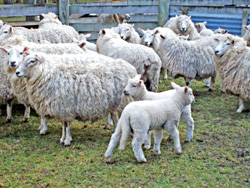Improvement of expression for sheep virus proteins
The maedi visna virus (MVV) causes encephalitis, arthritis, mastitis and chronic pneumonitis in sheep and as such, poses a real threat to the general well-being of the animal. Development of vaccines for the prevention of lentivirus infections have proved problematic. Reasons for this include lack of information on target antigens that will stimulate an immune response in the animal to fend off infection. As part of the overall research into MVV, project partners from the University of Torino in Italy aimed to develop viral proteins for use as antigens in immunological assays. To determine levels of immune response, lymphocyte T cell proliferation and cytokine production were measured. The ELISA (enzyme-linked immunosorbent assay) was also used to gauge the extent of the reaction. Two sets of viral proteins were expressed during the research. Viral structure consists of an outer envelope which surrounds an inner capsid, which in turn encloses the nuclear material. Capsid proteins were expressed using E.coli and then purified for use in immunoassays. The team also worked on protocols for expression of envelope proteins. Three genes coding for the proteins were bound to expression vectors and then transformed into various mammalian cells. To remedy initial lack of expression, a system of codon optimisation was used. This involved matching the codon (coding for the protein) frequency with that of the host cell expression system. This time, expression was observed. Vaccine development would offer protection from the insidious threat of MVV. The recombinant envelope proteins developed under this research can be used as a basis for further investigation into use in vaccines or as diagnostic reagents in immunoassays.







